End of Summit
The spring is in full bloom in Xiamen, and the sea and sky are brilliantly blue. As all things compete to flourish, global magnesium industry elites gathered in Xiamen, answering the eastern invitation: “Thousands of sails race along the southeastern coast, and the light of the magnesium industry shines across the four seas.” On April 10–11, the 13th Magnesium Summit, hosted by Asian Metal and co-organized by Shanxi Fuhengdi New Materials Co., Ltd., Anhui Huanyue Materials Technology Co., Ltd., and Wuchan Zhongda Qixin Alloy Materials Co., Ltd., was grandly held in Xiamen, Fujian. The summit addressed key topics spanning the entire magnesium industry chain, including magnesium ingots, powder, and alloys; aluminum alloys; titanium sponge; magnesium alloy die-casting; extrusion profiles; the automotive sector; and magnesium waste. The event received widespread support from industry professionals, attracting over 300 delegates from more than ten countries, including China, the United States, Canada, Brazil, Austria, the Netherlands, Russia, Germany, South Korea, India, and Japan. Global magnesium professionals gathered to discuss the industry’s future and explore new development directions.
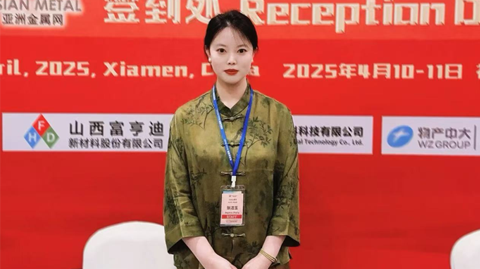
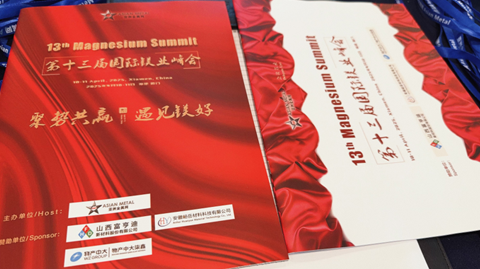
Sign-in
Sign-in
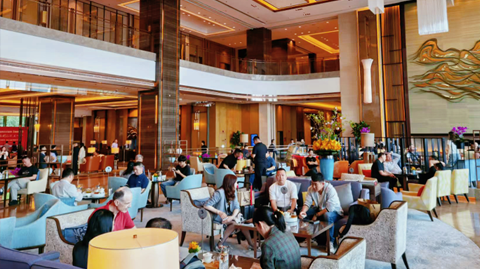

Sign-in
Sign-in

Sign-in
At 9:00 AM on April 11, Mr. Ben Jiang, Content Director of Asian Metal, officially opened the conference and warmly welcomed both returning and new attendees. Reflecting on 2024, he noted that the global economy remained under pressure due to escalating geopolitical tensions, rising trade barriers, and ongoing monetary policy risks. In the face of an oversupply of raw magnesium, weakened downstream demand, and frequent shipping disruptions, magnesium industry professionals have shown resilience—seeking opportunities amid adversity and driving forward with determination.
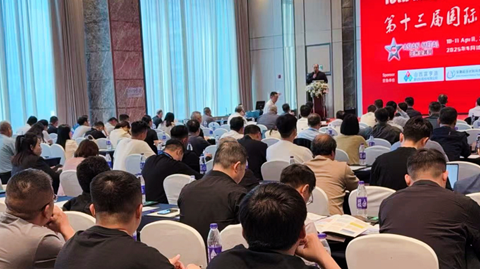
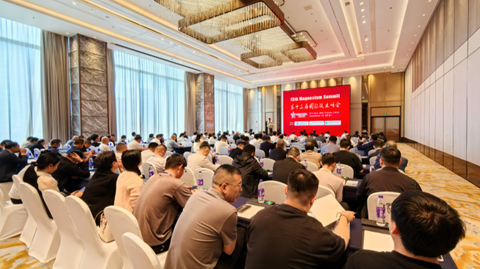
Ongoing forum
Ongoing forum
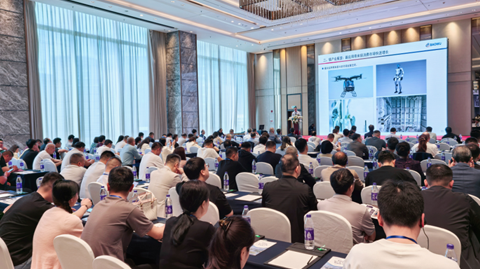
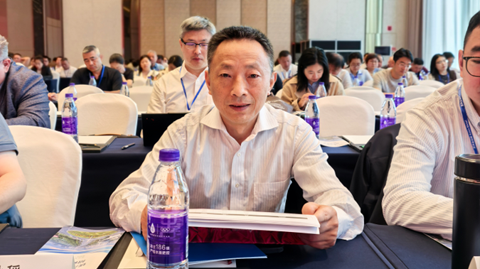
Ongoing forum
Ongoing forum
The summit then moved into the opening address segment. First to speak was Mr. Juncai Chai, Chairman of Shanxi Fuhengdi New Materials Co., Ltd. He highlighted the mission of Asian Metal to build a global platform for magnesium industry exchange and promote collaborative innovation. He emphasized that every summit serves as a catalyst for industrial advancement and technological breakthroughs. Mr. Chai proposed three key initiatives: (1) use innovation as the driving force to seize technological leadership, (2) adopt green development as a foundation for sustainability, and (3) strengthen cooperation to build a robust industrial ecosystem.
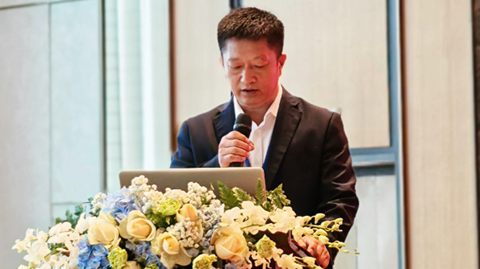
Juncai Chai, President of Shanxi Fuhengdi New Materials Co., Ltd.
Fuhengdi has long prioritized “innovation” and “green development” as dual engines for progress, having secured 49 patents to date. Its core technologies—such as the magnesium powder heating passivation device—have reduced energy consumption per ton to leading levels in the industry. Additionally, Fuhengdi's collaborative work on magnesium-based solid-state hydrogen storage has passed pilot testing, offering a novel solution for hydrogen energy transport and storage. With the development of digital factories, the company has achieved data interconnectivity across production processes, significantly improving resource utilization. Facing global energy transformation and industrial upgrading, Fuhengdi looks forward to deeper cooperation across the industry, expanding applications in new energy, high-end manufacturing, and aerospace, and together writing a new chapter in the high-quality development of the magnesium sector.
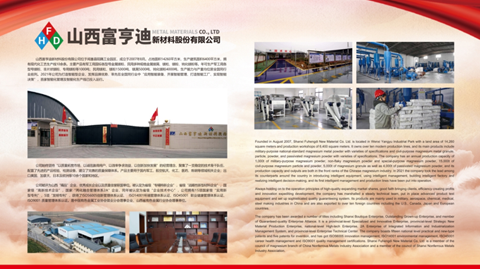
Next, Mr. Changgao Cao, General Manager of Anhui Huanyue Materials Co., Ltd., delivered his opening remarks. He acknowledged the challenges of 2024, including geopolitical conflicts, sluggish consumer demand, and magnesium prices lingering near cost levels. Yet, he emphasized that hardship presents a critical time for introspection and strategy. He urged industry peers to identify their unique advantages, clarify positioning, and invest decisively in development.
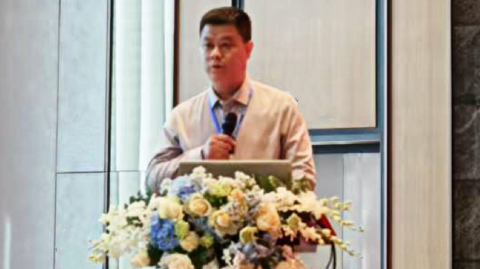
Changgao Cao, General Manager of Anhui Huanyue Material Technology Co., Ltd.
In April 2024, Anhui Huanyue launched a magnesium alloy production line that is now running near full capacity. The company has established a closed-loop model from waste recycling to magnesium alloy processing and back to recycled magnesium exports, integrating its original magnesium anode business to great effect. Responding swiftly to customer needs, Huanyue built a magnesium alloy particle production line, solving issues related to oversized or inconsistent particle sizes. The facility currently produces 300 tons monthly, with a target to reach an annual output of 10,000 tons by 2026.
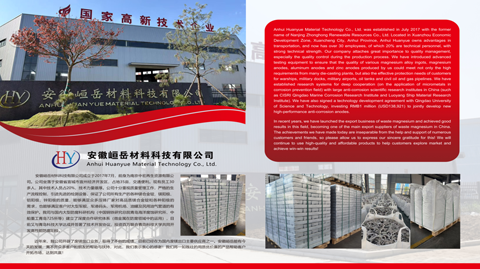
Following that, Mr. Fei Liu, Assistant General Manager and Marketing Director of Wuchan Zhongda Qixin Alloy Materials Co., Ltd., delivered his address. He echoed the sentiments regarding 2024’s economic turbulence and the magnesium industry’s mounting challenges—from increased raw magnesium supply and intensified competition to weakening demand and rising logistics costs. Nonetheless, he praised the industry’s perseverance, calling for unity, belief, and boldness in adversity.
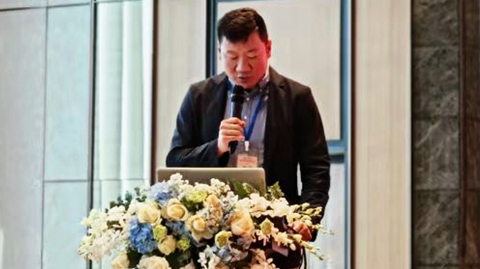
Fei Liu, General Manager Assistant of Wuchan Zhongda Qixin Alloy Materials Co., Ltd.
As a strategic extension of Wuchan Zhongda Group in new materials, Qixin Alloy Materials is committed to becoming a world-class magnesium service provider. The company emphasizes innovation, has significantly increased R&D investment, and has developed a unique growth path. Technologically, it leverages a “green intelligent smelting system” to optimize energy consumption. Under the “dual carbon” framework, magnesium alloy—being the lightest structural metal—holds great promise: each kilogram used can reduce vehicle lifecycle carbon emissions by 20 kg. The potential for a 100-billion-yuan carbon-reduction market is emerging. Despite ongoing challenges, Mr. Liu affirmed that innovation, green practices, and value chain collaboration will enable the magnesium industry to break new ground.
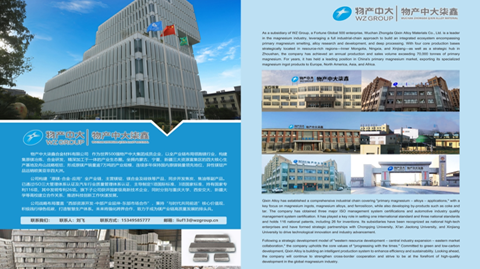
The forum then transitioned into its presentation segment. Mr. Xiaodao Liu, Deputy General Manager of Baowu Magnesium Technology Co., Ltd. and General Manager of Anhui Baomei Light Alloy Co., Ltd., presented on “Building a Comprehensive Magnesium-Based Industry Chain to Lead High-Quality Development.” As a central enterprise committed to providing solutions for steel and light metals, Baowu positions magnesium as a strategic pillar. With the push for carbon neutrality, magnesium's lightweight and recyclable traits make it ideal for new energy vehicles, aerospace, and electronics. The market is expected to exceed 100 billion yuan by 2030. Baowu will integrate the full industry chain—from mining to applications—under a “materials + services” model, supported by its strengths in innovation and green manufacturing.

Xiaodao Liu, Deputy General Manager, Baowu Magnesium Technology Co., Ltd. and General Manager, Anhui Baomei Light Alloy Co., Ltd.
Baowu has established major bases in Wutai (Shanxi), Qingyang (Anhui), and Chaohu, with a combined annual production capacity of over 500,000 tons. It promotes the integration of production, learning, and research, focusing on smelting technology, alloy innovation, and application development. Committed to global leadership, Baowu sees comprehensive layout and collaborative growth not as options, but as imperatives for industry leaders.
Next, Mr. Coen van Troyen, President of United Magnesium Co., Ltd. (Netherlands), spoke on “Deepening China-Europe Cooperation for a Win-Win Future in the Magnesium Industry.” In 2023, global magnesium demand reached 1 million tons, with China consuming 39%, North America 20%, and Europe 12%. Europe’s magnesium alloy and scrap demands are 58,000t and 5,000t respectively. As sustainability gains traction, scrap magnesium is increasingly valued for its low carbon footprint. United Magnesium has developed an advanced waste sorting system that includes manual inspection, screening, crushing, and color sorting, enabling efficient recycling across Europe.

Koen van Trojen, President of ALLIED MAG, The Netherlands, Europe
Then, Mr. Wang Qingshan, Director of the Qingyang County Commerce Bureau, gave a report titled “Qingyang Sets Sail: Investment Promotion for China’s Magnesium Capital.” Qingyang boasts over 5 billion tons of dolomite reserves, with 1.3 billion tons supporting the Baomei project, rich in high-quality, easily mined magnesium ore. With rapid socio-economic growth, Qingyang ranks among the top counties in Anhui for private economy and business climate. It now hosts 33 companies in the magnesium industrial chain and collaborates with the Anhui Magnesium-based New Materials Industry Innovation Research Institute to customize magnesium alloys for various high-performance applications.
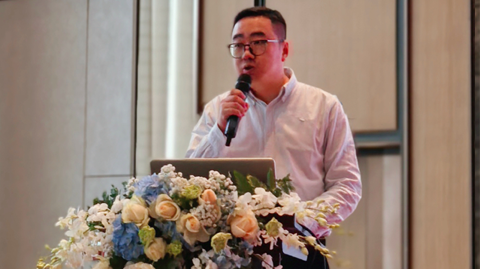
Qingshan Wang, Secretary of the Party Group, Director of Qingyang Bureau of Commerce
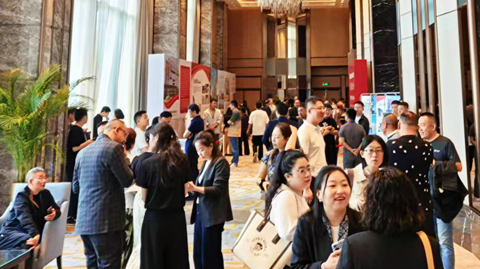
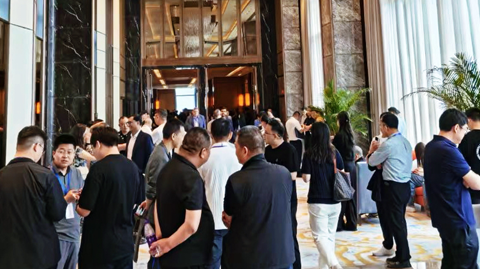
Tea break
Tea break
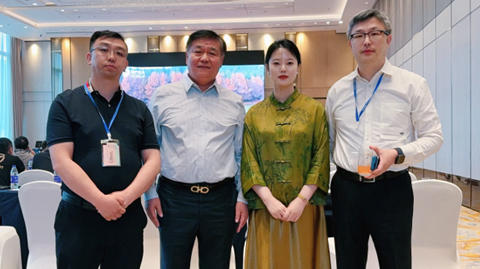
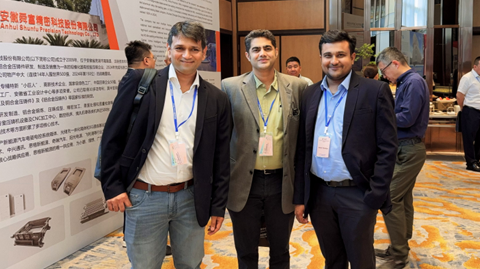
Tea break
Tea break
To reduce costs and boost efficiency, Qingyang has launched China's only short-process industrial park for direct magnesium water supply. Phase one covers 250 acres, with phase two expanding to 2,000 acres. Prioritized for die-casting and semi-solid projects, the park improves casting quality and shortens process flows, reducing power use by 20% and energy consumption by over 30%. These innovations can cut processing costs by RMB 1,200 per ton and material costs by RMB 5,000 per ton when using direct magnesium water instead of semi-solid particles.
After the tea break, Mr. Jin Chai, Deputy General Manager of Shanxi Fuhengdi, shared insights on “Global Magnesium Powder Market Trends and Future Outlook.” In 2024, the global magnesium powder market was 160,000 tons, with China supplying over 70%. Despite slower growth due to economic pressures and falling prices (FOB average down 19.5% YoY), demand from new energy vehicles and green technologies like hydrogen storage continues to drive momentum. By 2025, global new energy vehicle sales may exceed 21 million, each using 25 kg of magnesium alloy. The long-term demand for humanoid robots may reach 13,700 tpy. The industry is transitioning from traditional to high-end applications, with lightweight, green, and tech-forward solutions at its core. Chinese firms must balance price and innovation, leveraging policy support and emerging markets for sustainable growth.
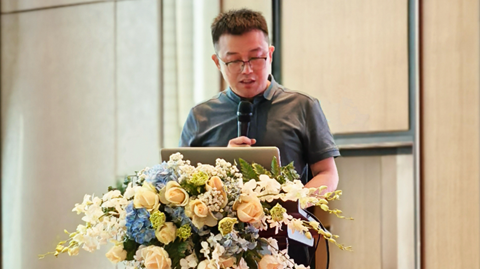
Jin Chai, Vice General Manager of Shanxi Fuhengdi New Materials Co., Ltd.
Shanxi Fuhengdi, founded in 2007, spans 17,760 square meters and operates over 10 production lines with 80+ employees. Now the largest and most comprehensive magnesium powder manufacturer in China, it produces 15,000 tpy of powder and granules, 5,000 tpy of magnesium chips, and 6,000 tpy of desulfurizers and passivated powder. Clients include major steel and pharma firms like Hesteel and Henglilai. Domestic market share rose from 12.56% in 2023 to 17.9% in 2024, with exports to South Korea, Japan, Canada, and Turkey through its Singapore branch.
Finally, Mr. Anhong Chen, Senior Engineer at SAIC Group Innovation R&D Institute, delivered a presentation on the “World's First Mass Production of SAIC’s Magnesium Alloy Electric Drive Housing.” Magnesium alloys, used to lighten vehicles by 100 kg, reduce battery capacity needs and overall emissions. The raw material cost advantage is significant—RMB 196 cheaper than aluminum for a 14 kg component. If 10 million vehicles (1/3 of 2024’s production) adopted magnesium alloys, it would add 500,000 tons of demand. SAIC’s second-generation semi-solid magnesium alloy drive housing—at 14 kg—cuts 7 kg off vehicle weight. The semi-solid injection molding process combines die casting and injection molding benefits, offering safety, efficiency, environmental friendliness, and high material utilization.
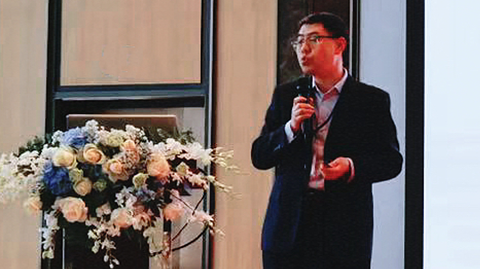
Anhong Chen, Senior Engineer of SAIC Motor R&D Innovation Headquarters
At 14:00 that afternoon, Werner Jaschinsky, CEO of Remag Light Metals Ltd., delivered an insightful presentation titled “The Current Situation and Outlook of Magnesium Market Demand under the Global Crisis.” Since 2005, Remag has been dedicated to supplying global light metals and providing comprehensive solutions, continuously optimizing production processes and reducing its carbon footprint.
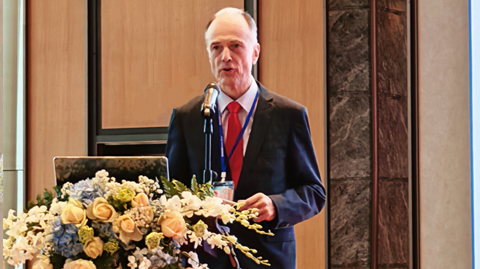
Werner Jaschinsky, CEO of Remag Leichtmetall GmbH
From a global perspective, the magnesium demand structure is predominantly driven by sectors such as energy, processing, aluminum and steel, casting, aviation, construction, automotive, and chemicals. Notably, the EU is almost entirely dependent on China for its magnesium imports. Currently, magnesium exports face repeated setbacks. European sanctions on Russian natural gas and oil, along with restrictions on domestic resource development, have exacerbated the situation. As a result, Europe is facing rising energy costs, declining competitiveness, reduced demand, and lower investment, effectively isolating itself from the global market.
Jaschinsky emphasized that China should take the lead in establishing a global CO₂ recovery market. He stated that globalization is the foundation of wealth creation, and China should adopt the openness of developed nations and move beyond a "nutshell" mindset. Global issues require global coordination: confidence + freedom = the promotion of carbon-neutral industrial production = rising magnesium demand. A carbon neutrality path guided by industrial demand will drive the magnesium industry’s long-term development, making magnesium an indispensable metal for a sustainable future.
Following this, Sanjay Arya, General Manager of DK World Metals Ltd. in India, gave an excellent report titled “Supply and Demand Situation and Development Trends of Magnesium Metal Market in India.” India is one of the fastest-growing major economies in the world. As of 2023, India’s nominal GDP stood at approximately USD 3.5 trillion, ranking it as the fifth-largest economy globally. Since the economic reforms of the early 1990s, India has maintained a steady growth rate of around 6% to 7% annually. Although its GDP growth rate has fluctuated in recent years due to global and domestic challenges, it has rebounded strongly post-pandemic. With continued structural reforms, increased foreign direct investment, and government initiatives promoting manufacturing and infrastructure, India’s GDP is projected to grow by 6.5% to 7% by 2025.

Sanjay Arya, General Manager of DK Metal World Limited
China accounts for 90% of global magnesium production, with the remaining 10% coming from Russia, Brazil, Turkey, and Israel. The major consumers include China, the United States, India, the European Union, Japan, and South Korea. In India, magnesium usage in the automotive sector is still relatively low compared to other leading automobile-producing nations. However, with the government's vigorous promotion of electric vehicles (EVs), this sector is expected to become the largest driver of magnesium demand. India currently hosts 23 EV manufacturers, a significant increase from fewer than 10 just a few years ago. More domestic and international manufacturers are planning to produce automobiles and commercial EVs in India.
Next, Long Huang, General Manager, Shaanxi Zhimagnesium Fusion Technology Co., Ltd. and Marketing Director, Zhizi Automotive Technology Co., Ltd., presented a compelling report titled “The Application of Lightweight Magnesium Alloys in Commercial Vehicles.”
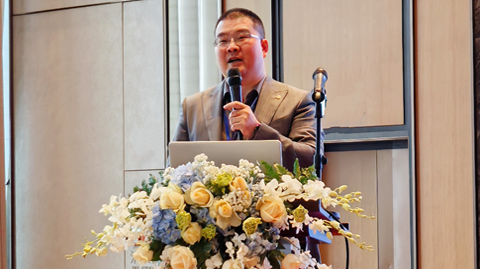
Long Huang, General Manager, Shaanxi Zhimagnesium Fusion Technology Co., Ltd. and Marketing Director, Zhizi Automotive Technology Co., Ltd.

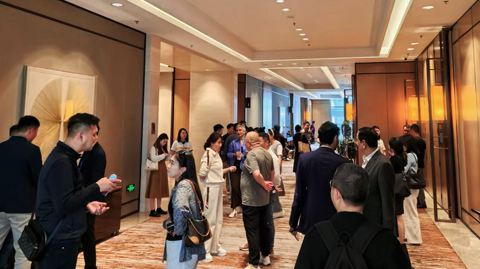
Tea break
Tea break
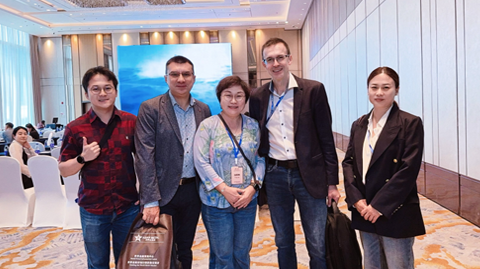
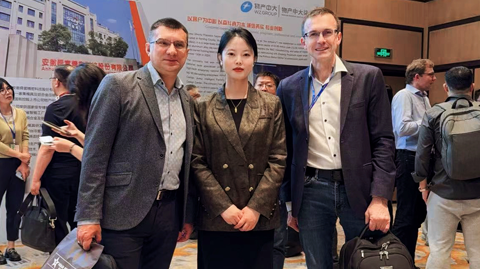
Tea break
Tea break
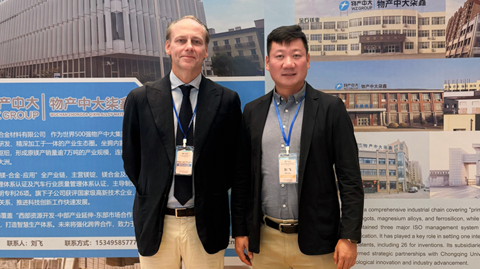
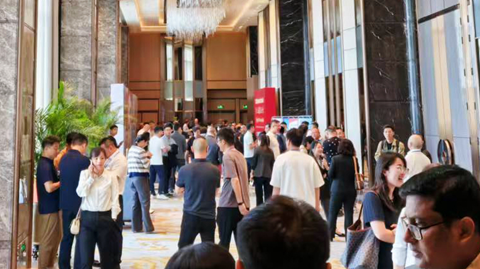
Tea break
Tea break
In the global push for energy conservation, emissions reduction, and carbon neutrality, the new energy vehicle (NEV) industry is rapidly gaining momentum, with new energy heavy trucks drawing significant attention. As the world’s largest automotive market, China has placed increasing importance on NEV heavy trucks. These vehicles, with their advantages in energy efficiency, emissions, and operational cost, are widely adopted in medium-to-short-distance logistics, engineering, ports, and mining. Production and sales continue to hit record highs. In 2024, China’s NEV heavy truck sales reached 82,000 units, with a penetration rate of 9%, marking a 140% year-on-year increase. Sales are expected to rise to 150,000 units in 2025.
This explosive growth has been underpinned by advances in battery technology, electric drive systems, and smart technologies, providing solid support for NEV heavy trucks. The surge has attracted both emerging players and established heavy truck manufacturers. Fierce competition is underway across product offerings (range, smart cockpits), pricing, and distribution channels (direct sales + dealerships), resulting in a CR6 (concentration ratio of top six firms) of about 70%—much lower than the 90% seen in traditional heavy trucks.
Proton Automobile is leading in technology incubation and industrial clustering around the themes of "intelligentization, networking, electrification, and lightweighting" in commercial vehicles. The company offers more than 100 commercial vehicle models, covering all mainstream NEV scenarios, and has received numerous accolades including the Red Dot Award, Potential Unicorn, and FDA Gold Award.
Finally, Asian Metal hosted a high-level panel discussion featuring renowned magnesium enterprises from China and abroad. The session was moderated by Mr. Bing Gao, General Manager of Yi'an Yunhai Technology Co., Ltd. Panelists included:
Mr. Changgao Cao, General Manager, Anhui Huanyue Materials Technology Co., Ltd.
Mr. Xiongguang Hu, Chairman, Zhejiang Luffy Magnesium Co., Ltd.
Mr. Daniel Chu, Deputy General Manager, Shaanxi Yulin Magnesium Industry (Group) Co., Ltd.
Mr. Zongkun Wang, Deputy General Manager, Shanxi Yinguang Huasheng Magnesium Co., Ltd.
Mr. Mingjun Wang, Deputy General Manager, Fujian Meifu Technology Co., Ltd.

Bing Gao of General Manager, Yian Yunhai Technology Co., Ltd.
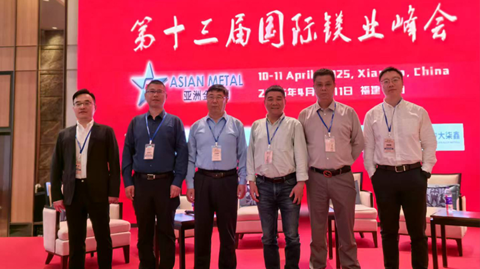
Disscusion
The panel explored several key topics, including forecasts for magnesium prices in 2025 amid shifting energy costs and supply-demand dynamics; new opportunities for magnesium applications in two-wheelers and power tools due to the widening magnesium-aluminum price gap; the emerging market for semi-solid magnesium alloy granules driven by NEVs; the potential boom for magnesium extrusion products amid the lightweighting trend; and the challenges the magnesium anode and scrap export market may face under evolving tariff policies. The discussion also addressed domestic and international opportunities for magnesium scrap recycling in the context of low-carbon initiatives.
At 18:00 on April 11, the 13th Magnesium Summit hosted by Asian Metal concluded successfully, thanks to the strong support of all participating representatives. Asian Metal will continue its work with unwavering enthusiasm and professionalism, staying true to its mission and moving forward with determination. Committed to building an “international platform and value summit,” we look forward to welcoming everyone again at the 14th Magnesium Summit!
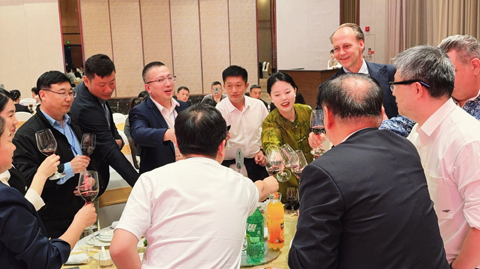

Reciprocal dinner
Reciprocal dinner
